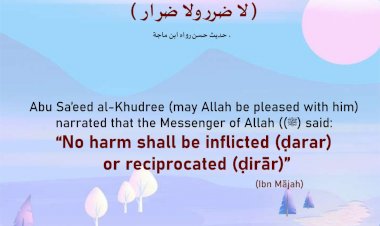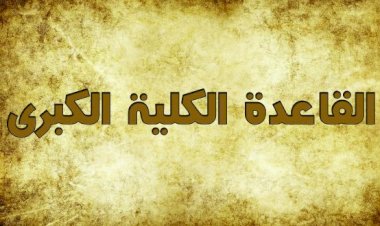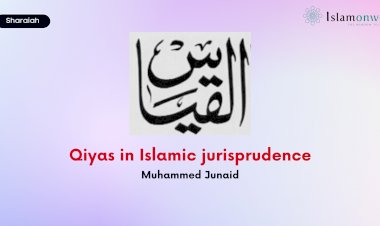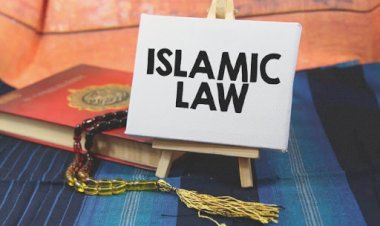Sub-Maxims Related to the Minimization of Harms in Unavoidable Circumstances - Part Four
By Dr. Sayyed Mohamed Muhsin, Dr. Muhammad Amanullah and Dr. Luqman Zakariyah
The maxims concerning the minimization of harms become relevant only when the complete elimination of harms turns to be impossible. When the complete elimination of harms becomes impossible, priority should be given to the elimination of the greater harms first.[1] Al-Qarāfī asserted that ummah agreed unanimously on that the greater benefit is preferred at the expense of lower benefit.[2] The universal maxim is to eliminate harm categorically whenever possible, but in the event when one has to choose between two contending harms and the complete elimination of harms is not feasible, one should prevent the occurrence of the greater harm by permitting the lesser harm. This maxim has two major components: (1) The greater harm should be prevented by committing the lesser harm and (2) Personal injury should be incurred to prevent general injury.
The greater harm should be prevented by committing the lesser harm
This maxim has been coined using many different phrases. Some of them are as follows:
- Al-Ḍarar al-ashadd Yudfaʿ bi al-ḍarar al-Akhaff [3] (The greater injury should be prevented by committing the lesser injury).
- Yukhtār Ahwan al-Sharrayn or Akhaff al-ḍararayn[4] (The lesser evil or injury should be preferred).
- Idhā taʿāraḍat al-mafsadatān rūʿiya aʿẓamuhumā ḍararan bi irtikāb akhaffuhumā[5] (If two evils clash, the greater one should be prevented by committing the lesser one).
Although these maxims are different in their wording, they convey the same meaning. According to this maxim, if a person is faced with choosing between two equal harms, he is free to choose between them. If they are not similar in their severity, committing the lesser harm to prevent the greater harm is religiously binding.[6] Abū Ḥāmid al-Ghazālī observed that in certain circumstances the degree of severity of the greater harm entails committing the lesser harm obligatory. For example, if consuming alcohol becomes the only way to save someone’s life, consuming it becomes obligatory in that situation.[7]
An incident that transpired during the life of the Prophet sheds light on the application of this maxim. A Bedouin urinated in the mosque of the Prophet, which angered the companions and they severely reprimanded him. The Prophet however said to them, “Do not put a halt to his urinating, but instead leave him”.[8] Afterwards, the Prophet ordered that a bucket of water be poured over the urinated area. Commenting on this incident, al-Nawawī remarked that the Prophet’s actions prevented the occurrence of a bigger harm by permitting a lesser harm.
Since the masjid had already been defiled with impurity (najas), stopping him from urinating would not have benefitted anyone then and would have only caused him harm by preventing him from urinating. Moreover, since he urinated in a small part of the masjid, preventing him from urinating could have warranted spreading the urine to other parts of the masjid and causing him to defile his clothes.[9]

In the story of the Prophet Musa with Khiḍr, which is narrated in chapter of al-kahf, portrays some models on prevention of greater harm compromising the lower harm. Khiḍr made a hole in boat in order to protect the people form an unjust king who used to seize on every good boat and he saved their wealth from being looted (the Quran, al-Kahf: 79). Likewise, Khiḍr slew a boy in order to protect his parents, who were believers, “from bitter grief upon them by [his] overweening wickedness and denial of all truth” (the Quran, al-Kahf: 80). Among others, the second incident exposes that injury upon true faith outweighs the injury upon human life.[10]
According to this maxim, harm to the embellishments (taḥsīniyyāt category in the maqāṣid) are tolerated in order to prevent harms to the needs (ḥāajiyyāt category) and to the essentials (ḍarūriyyāt category). Similarly, harms to the ‘needs’ are tolerated in order to prevent harms to the ‘essentials’. There are many instances which highlight the application of this maxim. Lying to protect oneself during a battle is permitted although it is harmful to the aspect of telling truth which one among embellishments.
Dumping people’s property in the sea while aboard a ship is permitted if they are deemed harmful to the lives of the people in the ship although it is harmful to the aspect of protection of property which is one among the ‘needs’. Joining the military is deemed necessary if the country needs to be protected from adversaries, even though it can inflict harms to the body and the person’s family, since the attainment of public benefits takes precedence over the attainment of private benefits. If dangers are inflicted on the ḍarūriyyāt, the harms to the religion are prevented by permitting harms to the body and wealth, and harms to wealth are tolerated to prevent harms to the body.
Within the category of essentials, the order of preference for preventing harm among them is religion, body, progeny, intellect and wealth. Inflicting harms on the life of a human being is a relatively bigger harm than the harms caused by the severing of a severely infectious organ. Therefore, committing one of the lesser harms is permitted to prevent harms to the life of a human being.[11]
Based on this maxim therefore, it is permitted to prevent that which is prohibited (ḥarām) by permitting that which is discouraged (karāhat). This maxim should be appended with two other maxims when deemed necessary. They are: (1) committing that which is prohibited is not allowed except in the case of dire necessity, and (2) necessity never requires obligating that which is inessential or optional.
The law of repudiation permits harm to the perpetrator to prevent the infliction of the greater harm of the perpetrator harming the public safety. In the event of the death of the mother during childbirth, operating on her is permitted if it can result in saving the foetus’ life.[12] If a person’s life is threatened and he is forced to choose between being killed and jumping off the cliff from the top of a mountain, according to Abū Ḥanīfah, he/she has the freedom to choose between the two.
However, according to Muḥammad and Abū Yūsuf, he should not jump because it is similar to committing suicide and a Muslim is not allowed to choose to kill himself/herself. The second opinion seems to be more in line with promoting maṣlaḥah, putting trust in Allah, and because it does not bear any resemblance to suicide.
Magnitude of harm is further divided as major harm and minor harm. The minor risks are acceptable because they are zero-like risk if one in million. The risk is tolerated if the probable outcomes are more beneficial, as in the case of surgeries the pains and expenses are justified by the big benefit of relief from severe diseases.
Personal injury should be incurred to prevent general injury
This maxim (yutahammal al-ḍarar al-Khāṣṣ li al-dafʿ al-ḍarar al-ʿāmm[13]) means that inflicting private harms to prevent public harms is permitted. It reflects the concern of the Sharīʿah for protection the best interests of the public. Here public refers to the wider community or a large group of people while private refers to a single individual or a small group of people. This maxim is relevant to the maqāṣid theory that states that public benefit takes precedence over private benefit.[14] Furthermore, secular theories also acknowledge the preponderance of public benefit in contrast to the private benefit, in line with the maxim “no one shall be deprived of his possessions except in the public interest.”
When harms are imposed on a private stakeholder to prevent harms to the public, it should be noted that if the harm is of a permanent nature and is not transient, that individual needs to be given due compensation in lieu.[15] According to al-Shāṭibī, if the land of a person was taken over for the benefit of the public, such as being used to construct a masjid, then he/she must be compensated with another land or with an appropriate amount of money. Using his land without compensating him inflicts harms on him, which is prohibited.[16]

The legality of many deterrent punishments in the Islamic penal code stems from the prevention and elimination of public harms. The majority of the public benefits from the implementation of the Islamic penal code, though at times it may inflict harms on private entities. The ḥadīth “no one hoards but a sinner”[17] illustrates the gravity of the harm in hoarding that inflicts the public interest. Al-Nawawī reiterated that hoarding is prohibited in the light of the benefit for the public.[18] Moreover, at times, people are barred from enjoying some of their private rights due to the harms they cause to the public. It is for this reason that the Prophet prohibited Abu al-Haitham from slaughtering a pregnant goat on the account of the benefit for the public by being kept it alive.[19]
Many prophetic traditions point to the application of this maxim. For instance, the Prophet says in a ḥadīth, “Whoever eats garlic or onion, let him not come near our mosque for angels are offended by the same things that offend the sons of Adam”.[20] Although the bad odor caused by eating garlic is not a significant harm, the fact that the Sharīʿah took steps to prevent it from irritating others highlights the concern it has for upholding the public interest.
The jurists have derived two maxims from the above ḥadith. The first is the prevention of the harm before its occurrence by prohibiting those who eat garlic to come to the masjid to prevent irritation from their bad breath to other worshippers. The second is permitting the private harm of depriving a person the reward of congregational prayer to prevent the public harm of the worshippers being irritated from his/her bad breath.
Based on this maxim, unqualified doctor, ineligible jurists and magicians are blocked from doing their jobs because they are placing the public at stake though they personally benefit by their works.[21] This maxim requires the agents to weigh two harms and their consequences and remove severe harm to preserve better interests. Based on this maxim, the interest of society is capable of overriding the individual interest. Therefore, biomedical issues, dangerous researches on human subject are sometimes allowed if their potential benefits to the society outweigh the individual risks.
(This article is part of a research work which was originally published on Islamic Quarterly, UK December 2019).
Reference
[1] Ibn Nujaym, al-Ashbāh wa al-Naẓā’ir, 90; Al-Suyūṭī, al-Ashbāh wal-Naẓā’ir, 87; ʿAlī Ḥaydar, Durar al-Ḥukkām, 1: 37.
[2] Al-Qarāfī, al-Dhakhīrah (Beirut: Dār al-Gharb al-Islāmī, 1994), 13: 322.
[3] Ibn Nujaym, al-Ashbāh wa al-Naẓā’ir, 88. Majallah, 27.
[4] Majallah, 29.
[5] Abū Iltibās AÍmad bin Yaḥyā Wānsharīsi, Īḍāḥ al-Masālik fīQawāʿid al-Imām Mālik, (Rabat: al-Lajnat al-Mushtarikah bayna Dawlatay Maghrib wa al-Imārāt, 1400), 370.
[6] Ibn Nujaym, al-Ashbāh wa al-Naẓā’ir, 89.
[7] Abū Ḥāmid Muḥammad al-Ghazālī, Mustaṣfā min ʿIlm al-Uṣūl(Cairo: Dār al-Kutub al-ʿIlmiyyah, 1993), 71.
[8] Abū al-Ḥusayn Muslim bin al-Ḥajjāj, Ṣaḥīḥ Muslim, (Beirut: Dār al-Jīl wa Dār al-Ᾱfāq al-Jadīdah, 2011), 1: 163.
[9] Al-Nawawī, Sharḥ Muslim, 1: 163.
[10] ʿIzz bin ʿAbd al-Salām, al-Qawāʿid al-Aḥkām, 1: 129; ʿAbd al-Raḥmān Nāṣir al-Saʿdī, al-Qawāʿid wa al-Uṣūl al-Jāmiʿah wa al-Furūq wa al-Taqāsīm al-Jāmiʿah, (Saudi Arabia: Dār bin al-Jawzī, 1421 AH), 66.
[11] ʿAbd al-ʿAzīz bin ʿAbd al-Salām al-Silmī, al-Fawā’id fī ikhtiṣār al-Maqāṣid, 46; Al-Ṭūfī, Sharḥ Mukhtaṣar al-Rawḍah, 4: 474; Ibn Nujaym, al-Ashbāh wa al-Naẓā’ir, 91; Al-Suyūṭī, al-Ashbāh wal-Naẓā’ir, 88.
[12] ʿIzz bin ʿAbd al-Salām, al-Qawāʿid al-Aḥkām fī Maṣāliḥ al-Anām, 1: 122.
[13] Ibn Nujaym, al-Ashbāh wa al-Naẓā’ir, 87; Al-Zarqā, al-Madkhal, 593.
[14] Al-Ḥamadī, Ghamz ʿUyūn al-Baṣā’ir Sharḥ Kitāb al-Ashbāh wa al-Naẓā’ir (Lebanon: Dār al-Kutub al-ʿIlmiyyah, 1405 AH), 1:280; ʿAdnān Jumuʿah, Rafʿ al-Ḥaraj fī al-Sharīʿah al-Islāmiyyah (Dār al-Imām al-Bukhārī, 1979), 25-35; al-Būrnū, al-Wajīz fī Īḍāḥ, 84.
[15] Al-Shāṭibī, al-Muwāfaqāt, 2: 349.
[16] Ibid.
[17] Abū al-Ḥusayn Muslim bin al-Ḥajjāj, Ṣaḥīḥ Muslim, (Beirut: Dār al-Jīl wa Dār al-Ᾱfāq al-Jadīdah, 2011), 5: 56.
[18] Al-Nawawī, Sharḥ Muslim, 5: 482.
[19] Abū al-Ḥusayn Muslim bin al-Ḥajjāj, Ṣaḥīḥ Muslim, (Beirut: Dār al-Jīl wa Dār al-Ᾱfāq al-Jadīdah, 2011), 6: 116.
[20] Abū al-Ḥusayn Muslim bin al-Ḥajjāj, Ṣaḥīḥ Muslim, (Beirut: Dār al-Jīl wa Dār al-Ᾱfāq al-Jadīdah, 2011), 2: 79.
[21] al-Zarqā’, al-Madkhal al-Fiqhī al-ʿᾹmm, 2:984-985.
(Sayyed Mohamed Muhsin is Assistant Professor at Department of Fiqh and Usul al-Fiqh, International Islamic University Malaysia, Kuala Lumpur; Dr. Muhammad Amanullah is Professor at Department of Fiqh and Uṣūl al-Fiqh, International Islamic University Malaysia; Dr. Luqman Zakariyah is Professor at Islamic Studies Unit, University of Kashere, Nigeria)
Disclaimer
The views expressed in this article are the author’s own and do not necessarily mirror Islamonweb’s editorial stance.
























Leave A Comment